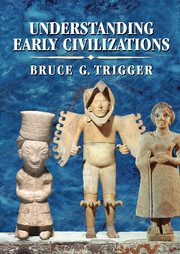Book contents
- Frontmatter
- Contents
- List of Illustrations
- Preface
- Understanding early civilizations
- Introduction
- 1 Rationalism and Relativism
- 2 Comparative Studies
- 3 Defining ‘Early Civilization’
- 4 Evidence and Interpretation
- Sociopolitical organization
- Economy
- Cognitive and symbolic aspects
- Discussion
- References
- Index
1 - Rationalism and Relativism
Published online by Cambridge University Press: 05 June 2014
- Frontmatter
- Contents
- List of Illustrations
- Preface
- Understanding early civilizations
- Introduction
- 1 Rationalism and Relativism
- 2 Comparative Studies
- 3 Defining ‘Early Civilization’
- 4 Evidence and Interpretation
- Sociopolitical organization
- Economy
- Cognitive and symbolic aspects
- Discussion
- References
- Index
Summary
The most important issue confronting the social sciences is the extent to which human behaviour is shaped by factors that operate cross-culturally as opposed to factors that are unique to particular cultures. In part this debate addresses to what degree and in what ways human behaviour is influenced by calculations of self-interest that all human beings make in a similar manner as opposed to particularistic, culturally conditioned, and largely autonomous modes of conceiving reality. Marshall Sahlins (1976: ix) has labelled this confrontation the ‘contest between the practical and the meaningful’. The debate goes beyond this, however, to consider to what extent humans may be biologically predisposed to understand reality and behave in similar ways. This debate has pitted materialists against idealists, behaviourists against advocates of cultural studies, processual archaeologists against postprocessual ones, and traditional cultural ecologists, as well as Darwinian archaeologists and sociobiologists, against neo-Boasian postmodernists. It has also split what remains of academic Marxism into two warring camps.
At the centre of this debate is a fundamental question: given the biological similarities and the cultural diversity of human beings, how much the same or how differently are they likely to behave under analogous circumstances? The answer to this question is crucial for understanding human behaviour and cultural change and for shaping the future course of human development (Trigger 1998a). In recent years theoretical positions have been elaborated with great subtlety and refinement, but there is no sign of consensus.
- Type
- Chapter
- Information
- Understanding Early CivilizationsA Comparative Study, pp. 3 - 14Publisher: Cambridge University PressPrint publication year: 2003



